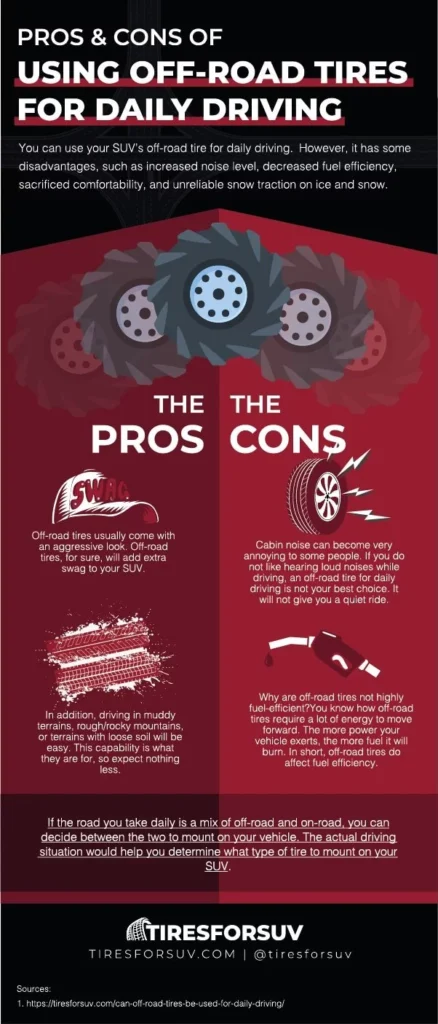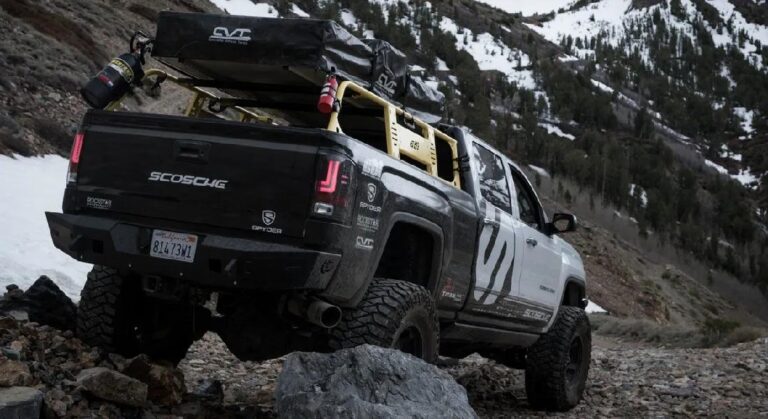Enthusiast drivers who love off-road driving will likely think of using their off-road tires for daily driving. Is this a good choice? Can off-road tires be used for daily driving?
Yessir! You can use your SUV’s off-road tire for daily driving. However, it has some disadvantages, such as increased noise level, decreased fuel efficiency, sacrificed comfortability, and unreliable snow traction on ice and snow.
If you want to use your off-road tires for daily driving, you can do so. But it doesn’t mean that since you can do so, it is the best option. If your daily route is not off-road, installing all-terrain tires on your SUV is better.
Let’s take a look at the disadvantages of using off-road tires for daily driving. Furthermore, we compare the driving experience between off-road and all-terrain tires.
Pros Using Off-Road Tires for Daily Driving

Off-road tires usually come with an aggressive look. Off-road tires, for sure, will add extra swag to your SUV.
In addition, driving in muddy terrains, rough/rocky mountains, or terrains with loose soil will be easy. This capability is what they are for, so expect nothing less.
However, if you are mainly driving on highways and not on off-road courses, you will probably feel the disadvantages of off-road tires.
Cons of Using Off-Road Tires for Daily Driving
As mentioned earlier, daily driving with off-road tires can have some disadvantages. Let’s take a look at a few of them below.
Increased Noise Level
Cabin noise can become very annoying to some people. If you do not like hearing loud noises while driving, an off-road tire for daily driving is not your best choice. It will not give you a quiet ride.
Off-road tires are naturally noisy because of the large tread blocks and deep tread design. If you read tire reviews, you probably have read about how off-road tires roar when driven on the highway.
Decreased Fuel Efficient
Why are off-road tires not highly fuel-efficient? You know how off-road tires require a lot of energy to move forward. The more power your vehicle exerts, the more fuel it will burn. In short, off-road tires do affect fuel efficiency.
Thus, if you want to save on your fuel or help minimize your carbon footprint, consider using another type of tire. The best alternative is to use an all-terrain tire. We will check out in a bit the advantages of using an all-terrain tire.
Less Comfortable
I don’t know about you, but to me, comfort is everything when I drive. I can hardly tolerate the vibrations you usually feel as you go through bumpy roads.
Why are off-road tires not capable of providing the enhanced comfort that most drivers expect?
Well, I don’t think it requires further elaboration. Off-road tires have heavy-duty construction. It is thick and heavy, so you cannot expect to experience optimal comfort when using it for daily driving. It will be a firm and rough everyday driving experience.
Unreliable Wet Roads and Ice/Snow Traction
Off-road tires are not known for their best traction on wet roads and snow. The traction level on wet roads may not be as reliable as with the other types of tires. The tread design is not perfect for these road conditions.
The common misconception is that off-road tires perform best in the snow because of their deep treads. Well, the reality is, it doesn’t. It is hazardous to drive your vehicle in snow that is less than a foot deep.
It doesn’t provide you with decent traction on ice and snow, so it is best to consider other options again.
Off-Road Tires vs. All-Terrain Tires for Daily Driving
Off-Road Tires
These tires are for terrains like mud, sand, loose soil, and rocks. They are feature large tread blocks design with deep and wide voids that help combat the off-road challenges.
These tires are clumsy and hard on paved roads. They require a lot of force to move, so it is not fuel-efficient compared to all-terrain tires. Driving short distances on the highway can be fine, but it may not be the best tire if you take a long trip on paved roads.
All-Terrain Tires
On the other hand, the tread blocks of all-terrain tires are smaller, and their voids are narrower. Thus, they are ideal to use on icy or snowy roads where the off-road tire can’t perform. For the same reason, all-terrain tires can run better on the highway compared to off-road tires.
The driving experience with all-terrain tires is also smoother and more comfortable. The noise that all-terrain tires make is way minimal to the noise that off-road tires make.
Best Tire Option for Daily Driving
If the road you take daily is a mix of off-road and on-road, you can decide between the two to mount on your vehicle. The actual driving situation would help you determine what type of tire to mount on your SUV.
If the off-road route is not that challenging or that very long, it is best to give some favor to the all-terrain tire. It is ideal for long driving over paved roads. If you want to experience enhanced comfort, all-terrain tires are the best choice.
You can also consider other types of tires like touring tires, high tires, or performance tires. However, if you do take some off-road terrains, your best choices would be dedicated off-road tires or all-terrain tires.
Related: Toyo Ultra Z900.
Conclusion
So back to the question: Can off-road tires be suitable for daily driving? Well, it would be if your daily driving involves a lot of off-road. However, for daily driving on-road, it may not be the best option.
Technically, you can keep your off-road tires while driving on roads, but you will have to bear with some disadvantages and inconveniences. These things include the loud noise that off-road tires make, the less comfort brought by the stiffness of the tire, the uneasy handling, and the fuel inefficiency.
My advice is, assess the type of roads you take every day. If you primarily traverse highways, mount all-terrain tires on your vehicle instead.

